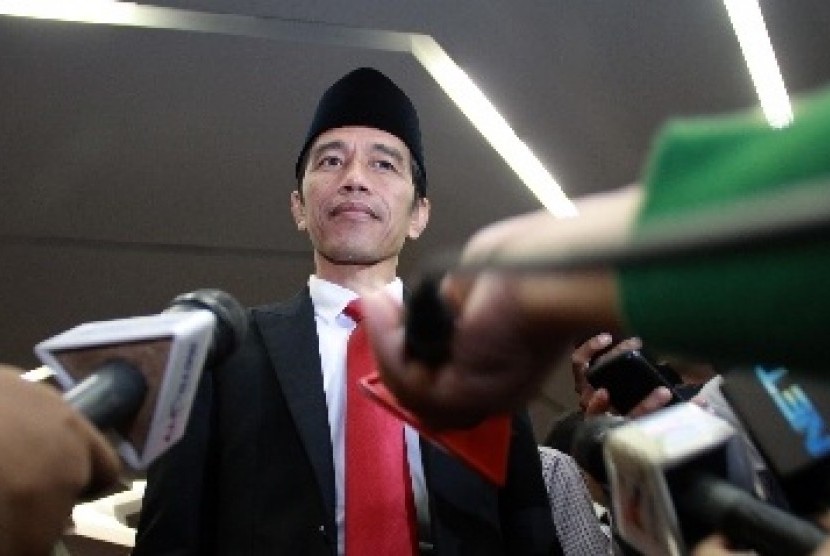REPUBLIKA.CO.ID, PONTIANAK -- A economics professor of Tanjungpura University in Pontianak, West Kalimantan, Eddy Suratman, has said a number of economic challenges would be faced by the new government.
"Economic slowdown caused internal as well as external factors would be among the challenges to be met," he said here on Sunday.
Former governor of Jakarta Joko Widodo (Jokowi) and former vice president Jusuf Kalla would be inaugurated as the country's next president and vice president respectively on October 20 to replace current president Susilo Bambang Yudhoyono and vice president Boediono following presidential election on July 9.
Prof Suratman said the Indonesian economy in 2015 would be marked by slow growth whose trend has already been seen in the past three years.
He said in 2012 the country's economy grew 6.2 percent but in the year after it grew only 5.8 percent and this year it is predicted to grow only 5.3 percent.
The Jokowi-Jusuf Kalla government has set a target of around 7 percent growth for the period of 2015-2019. The professor said that the realization of the target would be much lower causing reduction in the people's welfare, marked by increasing unemployment and poverty.
Regarding internal factors that would hinder economic development, Suratman referred to slow infrastructure development, weak law enforcement, low manpower quality and bureaucratic problems that would cause inefficiency and hindrance to investment.
Due to them he said the government would have difficulties overcoming the country's current account deficit.
He said the widening of the trade deficit would result in the widening of the current account deficit and pressure on the country's rupiah currency.
Other domestic problems to hinder economic development are problems of budget expenditure quality and maintenance of price stability as well as financial stability, he said.
He said efforts had to be taken to improve investment competitiveness, by synchronizing central and regional regulations and licensing procedures and by improving infrastructure including electricity and inclusive growth.
"External challenges to face meanwhile will come from the US government's plan to issue a policy to reduce economic stimulus which will certainly affect Indonesia's economy through trade as well as finance," he said.
Suratman admitted that on the one hand the US tapering-off policy was a signal of US economic improvement that will increase exports from Indonesia directly or indirectly.
"The US economic improvement certainly would boost the buying power of the Americans for goods imported from the developing countries such as Indonesia," he said.
On the other hand he said the US economic improvement would trigger global investors to withdraw their funds from emerging markets including Indonesia to be invested in the US economic sectors.
"This will weaken the rupiah exchange rate as a result of capital outflow," he said.
Eddy Suratman said if the Jokowi-JK government would meet the seven percent growth target in 2015 they had to make basic changes in the 2015 budget by reducing fuel subsidy.
He said the funds from the subsidy reduction could then be used to finance infrastructure development in villages and social assistance through productive programs for the poor.
"From a policy aspect the government could anticipate the depreciation of the rupiah exchange rate by improving the current account deficit and inflation through fiscal policies such as imposing additional sales tax on luxury goods for specific purposes, increasing the use of biodiesel, reducing income tax for certain industries, optimizing income tax for investment incentive, improving trade order to meet needs and simplifying investment licensing procedures," he said.
He said the fiscal policies certainly had to be accompanied by other policies which are more structural and have a mid-term dimension such as accelerating infrastructure development, increasing the quality of expenditures including regional government spending, improving legal certainty and bureaucratic reform and accelerating development of downstream industries for agricultural, plantation and mining products to increase their economic added value," he said.
Suratman believed with the policies first President Soekarno's vision of political sovereignty, economic self-sufficiency and social and cultural character presented in his speech titled "Trisakti" in 1963 would be realized.
"Although it was presented more than half a century ago the substance of his speech is still relevant for the new government to adopt as its vision including for national economic development," he said.
He said the new government's decision to adopt sovereignty and self-sufficiency as principles for developing the country's economy and resources was correct and contextual in view of the current foreign domination of the country's economic sectors so far.


